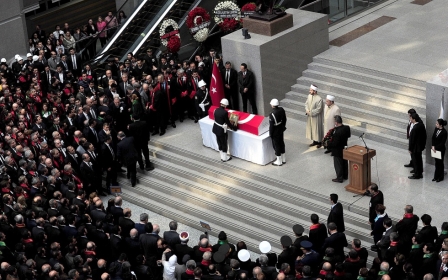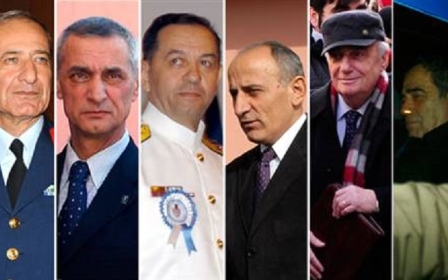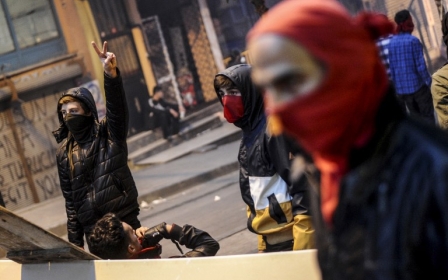Turkey's AKP announces electoral list

Tukey's ruling Justice and Development Party, AKP, has announced its list of candidates running for the upcoming 7 June general elections.
The party officials submitted the candidate list to the Supreme Board of Election (YSK) in Ankara on Tuesday evening, local newspapers reported.
According to the list Prime Minister Ahmet Davutoglu will run as a candidate for Konya, his hometown in central Anatolia.
AKP deputy chairman Mustafa Sentop announced during a press conference on Tuesday that 99 out of the 550 AKP candidates are female party members and 105 current AKP deputies have not been included on the list, according to the Daily Sabah.
Deputy prime minister and AKP spokesperson, Besir Atalay, said during another press conference that many nominees did not make it to the final list because of their close ties of kinship with the current candidates or prominent figures within the party, in reference to the non-candidacy of Osman Gokcek, the son of Ankara Mayor Melih Gokcek.
Despite Atalay’s declaration, Berat Albayrak, President Erdogan’s son-in-law, has been nominated as candidate for Istanbul.
Albayrak was until late 2013 the chief executive of the Calik Holding conglomerate. He has more recently been writing economic commentaries in pro-government newspapers, which to some observers were a sign that he may be headed for politics, reported Hurriyet Daily.
There were rumours that Erdogan's younger daughter Sumeyye could herself stand for the 550-member parliament but this was rejected as untrue by the AKP.
Other candidates running for Istanbul – a seat occupied by Erdogan himself during the previous elections - are current Environment and Urbanism Minister Idris Gulluce, European Union Minister Volkan Bozkır and AKP Vice President Mustafa Sentop.
A total of 70 MPs in the ruling party will not be able to run again in the June elections due to the three-term rule included in the party by-laws.
Among them are Deputy Prime Minister and government spokesperson Bulent Arinc, Deputy Prime Minister Ali Babacan, Labour Minister Faruk Celik and Foreign Minister Mevlut Cavusoglu, along with other senior figures.
There are several surprises on the list, most notably the AKP nomination of Savci Sayan, a former member of the main opposition Republican People’s Party (CHP) and adviser to former CHP leader Deniz Baykal.
But the surprises are not limited to the AKP candidate list.
Ekmeleddin Ihsanoglu, the former head of the Organisation of Islamic Cooperation (OIC) who stood against Erdogan in the presidential polls as the joint candidate of opposition parties MHP and CHP, will be a candidate for the opposition Nationalist Movement Party (MHP).
Selina Ozuzun Dogan, a lawyer who belongs to Turkey's Armenian minority, will stand for the opposition Republican People's Party (CHP) in an unusual move for the party seen as the standard bearer of the secular elite.
The CHP is also fielding a candidate from the Roma minority, Ozcan Purcu, in the Izmir region.
Much in the election will depend on whether the pro-Kurdish People's Democratic Party (HDP) can break the 10 percent threshold required to automatically obtain seats, which could destroy the AKP's hopes of winning a constitutional majority.
A German-born Yazidi politician, Feleknas Uca, has been named by HDP to stand on their list for the southeastern city of Diyarbakir. Uca sat in the European Parliament as a representative of German left-wing party Die Linke.
Presidential system
According to the AKP's campaign calendar, the election manifesto is expected to be unveiled to the public on 15 April during a mass ceremony in Ankara, when Davutoglu will introduce the party candidates.
The 2015 parliamentary elections are of key importance to the AKP government as it seeks to work with the parliament to draft a new constitution as Davutoglu has promised to replace the current one, which was written after the 1980 military coup.
But above all, the election manifesto of the ruling party will include the introduction of a presidential system, for which Turkish President Recep Tayyip Erdogan has been pushing in order to replace the current parliamentary system.
But the AKP does not have enough seats in parliament to vote for a constitutional change.
According to the current Turkish constitution, such a change requires the approval of two-thirds (367) of the (550) lawmakers. Only then can the president approve it or hold a referendum on the matter.
Turkish citizens voted in a referendum in 2007 to be able to elect their president by popular vote.
There have been continuous claims made in local media over the interference by Erdogan in the selection process of AKP candidates. Presidential spokesperson Ibrahim Kalin rejected those claims on Tuesday saying that the Turkish president had only met with Davutoglu to discuss the presidential system.
The ruling party has set ambitious goals for the 100th anniversary of the Turkish Republic in 2023, namely for Turkey to become one of the world's 10 biggest economies.
The other significant part of the election manifesto is expected to include the government's fight against the so-called "parallel state," which refers to a purported group of Turkish bureaucrats and senior officials embedded in the country's institutions, including the judiciary and police, who are allegedly trying to undermine the elected government.
Election calendar
The election board will announce the shortlist of candidates, including the independents, on April 24.
The election campaign for all parties will start on 28 May and end on 6 June.
After the candidate list is published in the Official Gazette, the premier will embark on his nationwide election campaign tour on 27 April.
Davutoglu is expected to visit 30 metropolitan areas and other provinces that he has not had the chance to travel to since he became prime minister in August last year.
A total of 6,223 people - including 584 disabled Turkish citizens - submitted applications to run for 550 seats in the Turkish Parliament under AK Party colours, according to Mustafa Atas, head of the AK Party election coordination centre.
The figure was 5,718 for the 2011 general polls, he said.
The highest number of applications was for Istanbul, with 1,166 applicants, followed by Ankara with 536 and Sanliurfa with 281 applicants.
New MEE newsletter: Jerusalem Dispatch
Sign up to get the latest insights and analysis on Israel-Palestine, alongside Turkey Unpacked and other MEE newsletters
Middle East Eye delivers independent and unrivalled coverage and analysis of the Middle East, North Africa and beyond. To learn more about republishing this content and the associated fees, please fill out this form. More about MEE can be found here.




